# Share a connector
You can share your connector with other users in the Share tab after you build your custom connector. You can share your connector with open or closed source code through the community library or using a link.
# Released versions and shared versions
| Shared version | Released version |
|---|---|
| Your connector's shared version is the version which others receive when they install your connector for the first time. When you share a new version, everyone who installed your connector receives an option to update their connectors as well, including child connectors. | Your connector's released version is the version all your recipes use. When you release a new version of your connector, all recipes using this connector update to use this version immediately. |
# Upload a connector to the community library
Upload your connector to the community library
Complete the following steps to upload a connector to the community library:
Go to Tools > Connector SDK.
Select the connector you plan to upload.
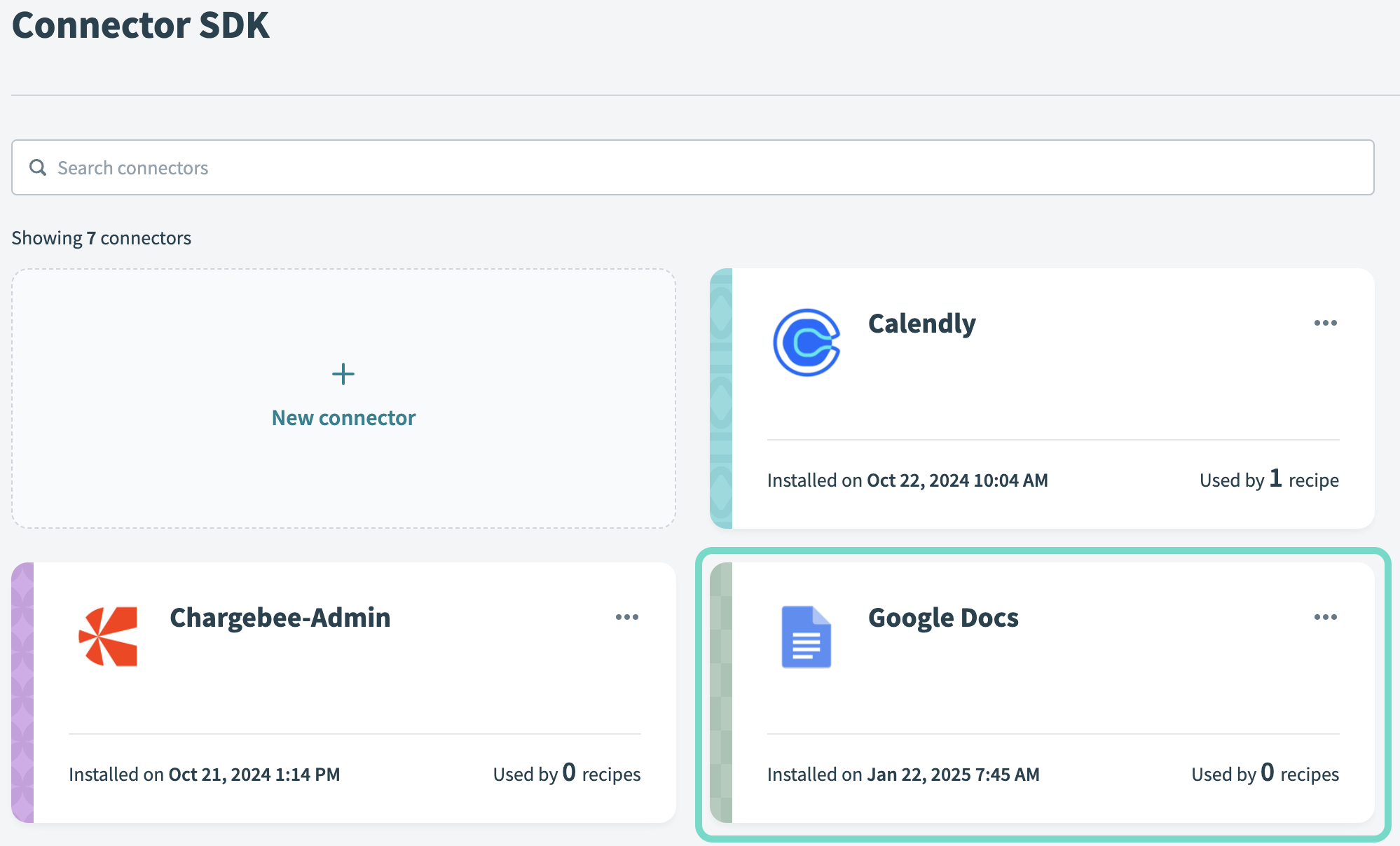 Click the connector you plan to upload
Click the connector you plan to upload
Go to the Share tab, then click Share version.
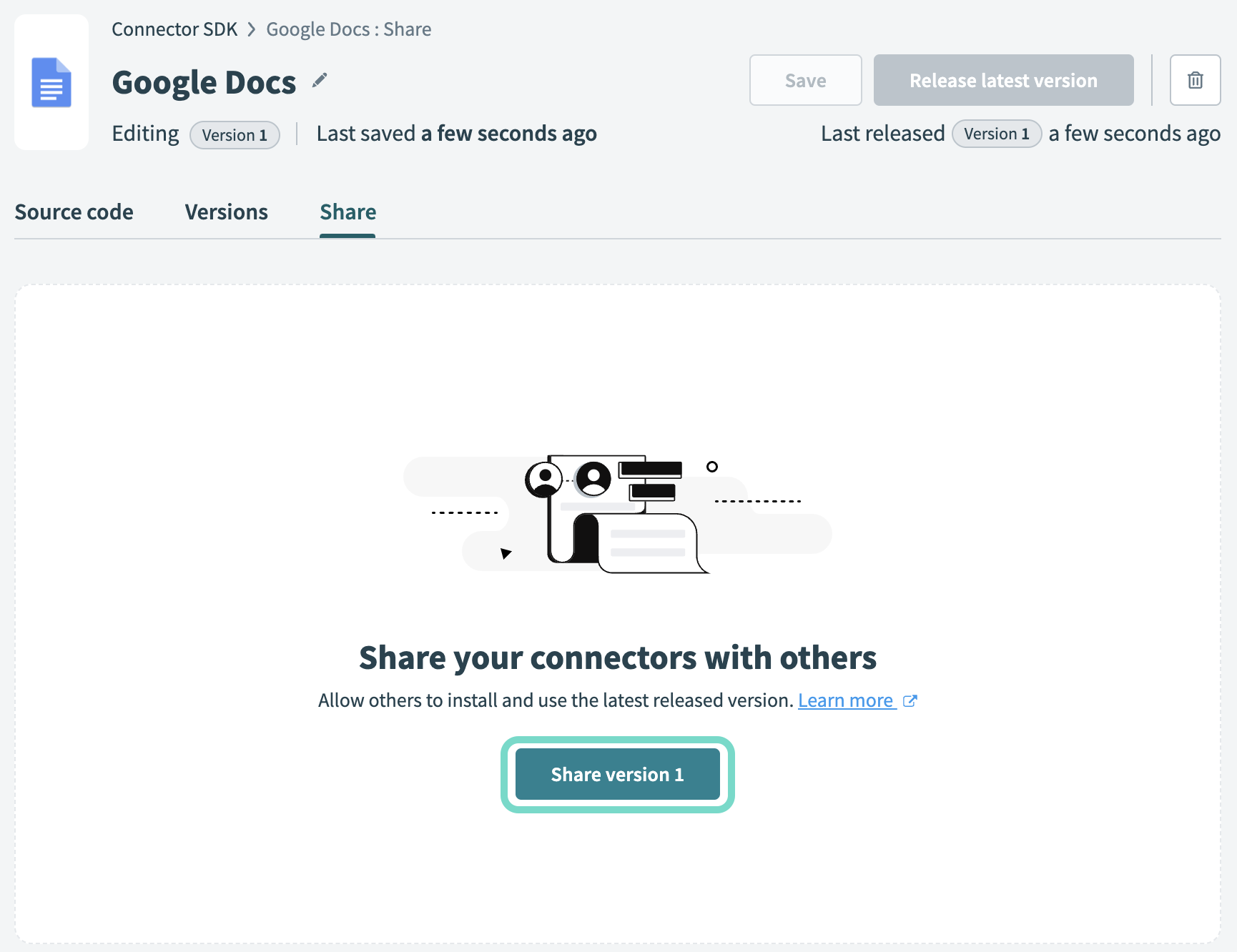 Click Share version
Click Share version
Click Publish connector to open the List on community library dialog.
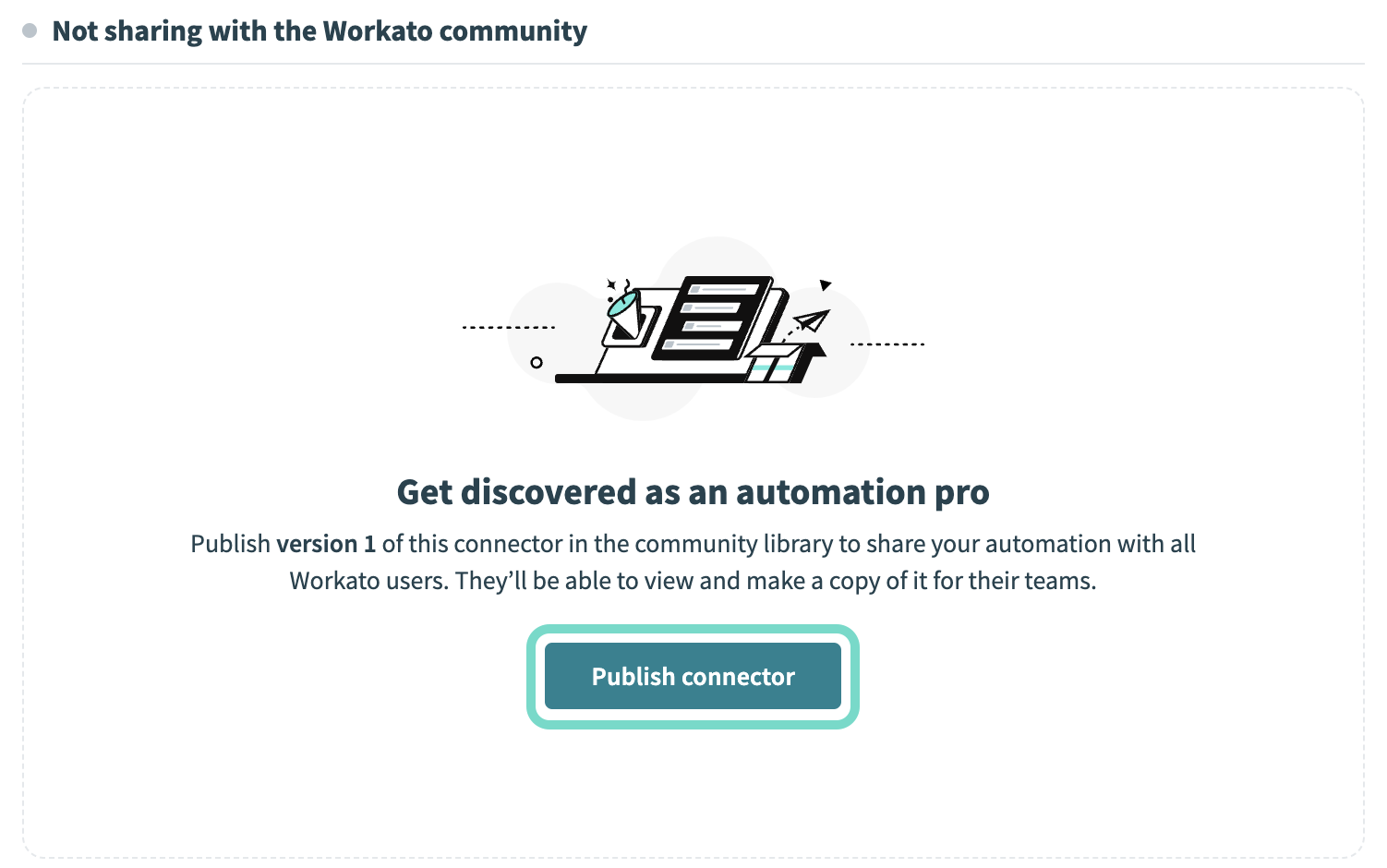 Click Publish connector
Click Publish connector
Enter the name of the App this connector is built for. This field is case-sensitive. It will take longer to review your connector if its associated app is not listed in the drop-down menu, as Workato needs time to verify new apps.
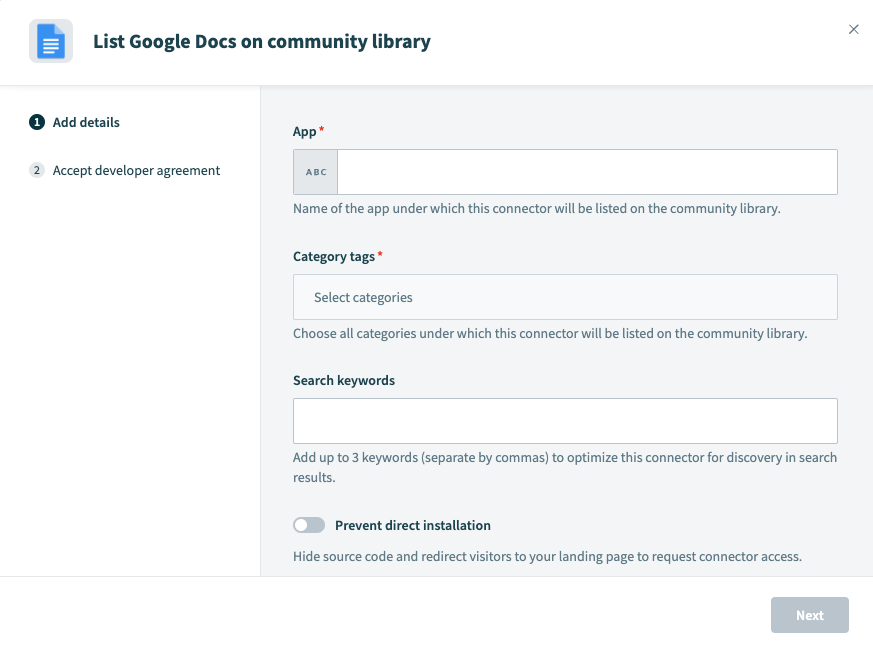 The Add details section
The Add details section
Select any relevant tags in the Category tags drop-down menu.
Enter up to three Search keywords separated by commas.
Click the Prevent direct installation toggle if you plan to hide the connector's source code and redirect visitors to your landing page to request connector access.
Provide a Landing Page URL if you enabled Prevent direct installation. The page you link should showcase the connector and provide a clear path to your private sharing link. Go to the Sharing privately using a link section of your connector's Share tab to access your private sharing link.
Read the Workato developer agreement and click the checkbox to accept the terms and conditions.
 Read the Workato developer agreement
Read the Workato developer agreement
Click List connector to submit your connector for review.
Wait one business day for your connector to be reviewed. You can monitor the status of your submission in your connector's Share tab. Workato will notify you through your community profile's email when your connector has been reviewed.
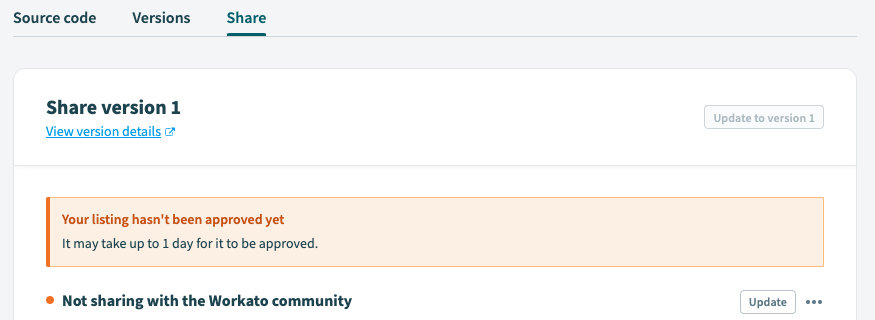 Monitor your connector's status
Monitor your connector's status
REQUIRED PERMISSIONS
Uploading connectors to the community library requires full access to the Connector SDK. If you don't have the required permissions, contact your workspace admin to help you upload the connector.
# Share a connector with a link
FEATURE AVAILABILITY
Closed code source connector sharing is subject to the following limitations:
- Collaborating workspaces must use the same data center as the custom connector's developer. Refer to Share data between regions for more information on cross-region collaboration.
- Partners must be given access to this feature. Contact your Customer Success Representative to learn more.
Complete the following steps to share your custom connector with a link:
Go to Tools > Connector SDK.
Select the connector you plan to share.
 Select a connector
Select a connector
Go to the Share tab.
Click Set up connector sharing to open the configuration module.
If your workspace has access to closed source connector sharing, you can decide to share your connector as open or closed source:
Click the Enable shareable link toggle to share your custom connector with others through a link.
# Manage closed source connector access
Complete the following steps to manage access to your closed source connector:
Go to Tools > Connector SDK.
Select the connector you plan to manage, then go to the Share tab.
 Select a connector
Select a connector
Click Manage access.
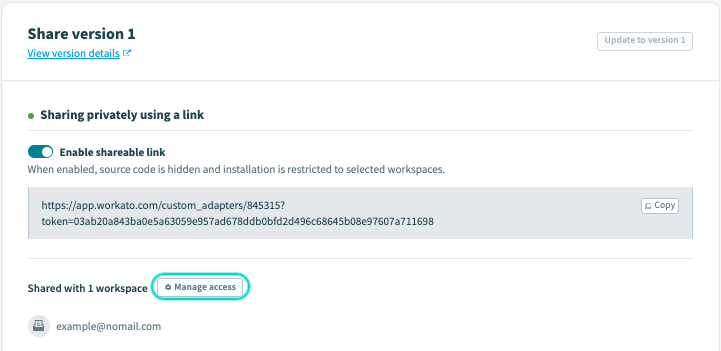 Closed source managed access
Closed source managed access
Add or remove workspace email addresses to manage the workspaces that can view and install your connector. Separate each email with a comma. These workspaces do not have access to your connector's source code.
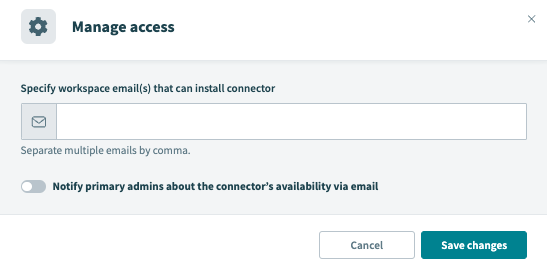 Manage access to your connector
Manage access to your connector
Click the Notify primary admins about the connector’s availability via email toggle if you plan to notify primary admins about the changes.
Click Save changes.
# Switch between open source and closed source
Switching your connector between open and closed source has the following effects:
Complete the following steps to switch your connector between open source and closed source:
Go to the Share tab of the connector you plan to modify.
Click Change to show source code or Change to hide source code.
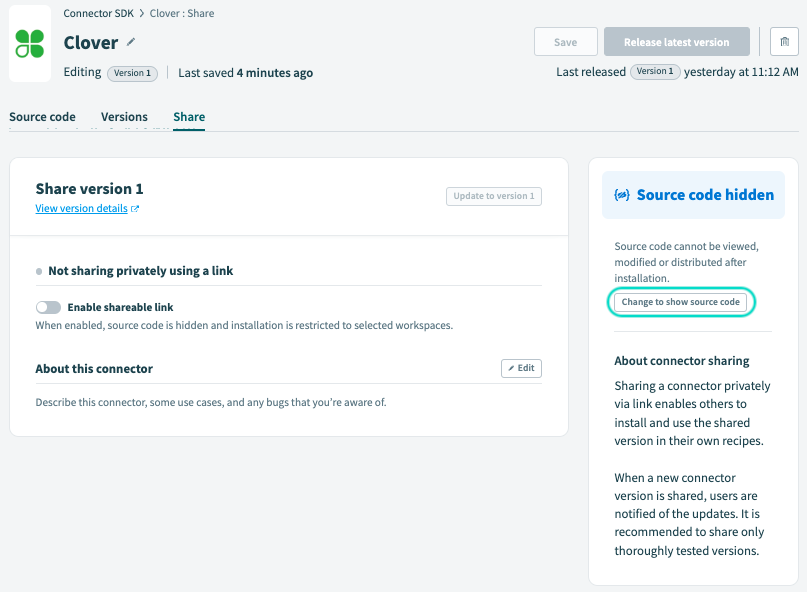 Change source code button
Change source code button
Click Update connector.
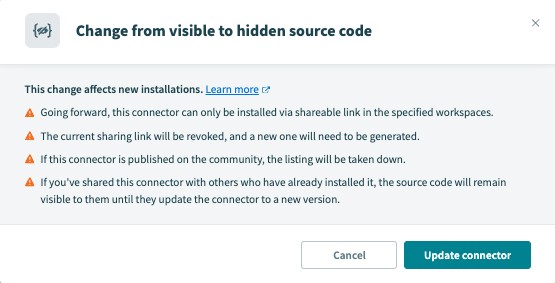 Click Update connector
Click Update connector
# Export packages with custom connectors
You can use the Recipe lifecycle management tool to export and import entire folders of recipes from a sandbox environment to a production environment in Workato. Recipes that you plan to export from one account and import into another often contain custom connectors that you have built or cloned. Workato helps to export custom connectors in the manifests when you export these recipes.
The latest released version and the attached version note of your custom connector used in recipes are included in the manifest export. Find out more about exporting here.
# Import a manifest with custom connectors
Workato first checks for an existing copy of the custom connector when you import a manifest. If no existing copy is found, a new custom connector is created with the latest released version as version 1. If an existing copy is found, a new latest version is created instead. In both cases, importing a manifest immediately releases the latest version of the custom connector for you because the recipes you are importing use that latest version. Find out more about importing here.
EXPLORE RECIPE DEPENDENCIES
Be sure to explore dependencies in the existing recipes in your production account when importing a manifest that overwrites a connector.
Last updated: 10/23/2025, 8:27:15 PM
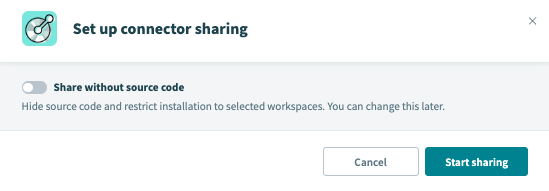 Share your connector as open source
Share your connector as open source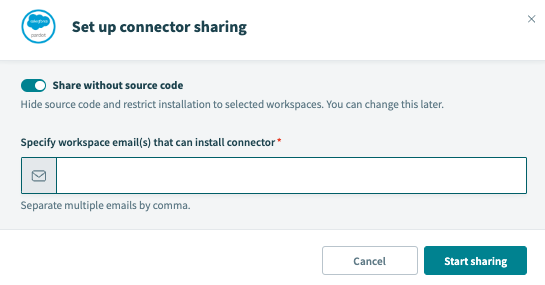 Share your connector without source code
Share your connector without source code Closed source shareable link
Closed source shareable link Open source shareable link
Open source shareable link